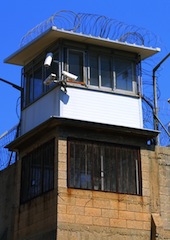Pity the Germans!
Why can the U.S. military detain anyone worldwide for exercising press freedom?
August 28, 2013

One can only pity the Germans. First, they had to live under the Nazis. Then, those Germans unfortunate enough to be caught in East Germany had to endure the same sort of legal regime under the so-called German “Democratic Republic.”
When the Berlin Wall finally fell, all Germans finally felt free of the practices of despotic states: total surveillances and legal provisions that allow a dissident to be treated as an enemy under martial law.
With Edward Snowden’s revelations, German citizens feel alarmed again. They know their ally, the United States, considers them targetable for surveillance as much as China, Iraq or Saudi-Arabia, according to Der Spiegel.
So do the Germans have a reason to be upset — or is this a storm in a teacup, whipped up by some overly sensitive people?
This story is far bigger than Edward Snowden or even the spying activities he revealed. As of July 17, 2013, when a new court decision came down in the United States, it has been clear that Germans (and many other non-Americans) have plenty of reason to be worried — very worried indeed.
Military Detention for Publishing Leaks
As a recently retired U.S. Army Judge Advocate General, I don’t say this lightly. Under a decision issued by the Second Circuit of the U.S. Court of Appeals in the case Hedges v. Obama, the Court lifted an earlier injunction preventing indefinite military detention for exercising rights of a free press and free speech if it hurts U.S. counterterrorism.
The plaintiffs bringing this case included U.S. journalist Chris Hedges, Pentagon Papers leaker Daniel Ellsberg, author Noam Chomsky, as well as two non-U.S. journalists and activists, including an elected official from Iceland.
The latter, the Hon. Birgitta Jonsdottir, is a Member of Parliament in Iceland. She is now at risk of indefinite U.S. military detention for working to create a “safe haven for freedom of information in Iceland.”
Ms. Jonsdottir also helped produce the video “Collateral Murder,” which depicts an American helicopter opening fire on unarmed individuals in Iraq.
As part of an investigation related to that video, she has received a subpoena from a federal grand jury for content from her Twitter account. Because of the subpoena and her fears of detention, she will no longer travel to the United States.
What should send chills down the spines of Germans is the threat to plaintiff Kai Wargalla, a German citizen. Ms. Wargalla is an activist based in London, associated with organizations to include Occupy London and Justice for Assange UK.
Beginning in 2011, she organized rallies, demonstrations, and protests on behalf of Wikileaks founder Julian Assange and U.S. military leaker Private Chelsea Manning. Ms. Wargalla testified that her fears of U.S. detention under the law the Second Circuit has just upheld have made it nearly impossible to pursue her everyday work.
That law affirms the authority of the U.S. Armed Forces to detain covered persons pending disposition under the law of war.
“Covered persons” include any person who has committed a belligerent act or “supported” hostilities in aid of the enemy, not just persons who aided the terrorist attacks that occurred on September 11, 2001. It is foreseeable that could include aiding leakers of classified U.S. data like Chelsea Manning or Edward Snowden.
“Disposition of a person under the law of war” may include detention under the law of war without trial, or a military tribunal for trying the case without fair trial rights or due process, largely in secret as at Guantanamo.
According to the Court, the relevant law extends beyond U.S. borders and would cover such activities in aid of the enemy by foreign citizens, including those of German journalists and activists.
Who the United States deems an “enemy” is defined by the U.S. military under Article 99 of the Uniform Code of Military Justice as: “Enemy is not restricted to the enemy government or its armed forces. All the citizens of one belligerent are enemies of the government and all the citizens of the other.”
When debating the law establishing indefinite military detention for aiding the enemy, U.S. Senators in support of the legislation declared the entire globe to be a “battlefield” in the War on Terror.
Thus, a fair reading of that definition under the circumstances of today means all non-U.S. citizens could be considered to be the “enemy” under Article 99. With this expansive definition, it is impossible for foreign citizens not to “aid the enemy.”
Strict application of this law would readily give U.S. military jurisdiction over a German citizen, or any other non-U.S. citizen, who passes on a Der Spiegel or Guardian article containing still classified information.
That person would then be subject to detention for “disposition under the law of war” by the U.S. military. It would be left to the discretion of the commander-in-chief to decide whether to act on that legal prerogative.
U.S. Military Commissions prosecutors have made it clear what this now means for the U.S. in the 21st Century, coining the phrase “U.S. common law of war.”
Globalizing the American Civil War
This U.S. common law of war is composed of those legal precedents drawn — over a century and a half ago — from the U.S. Civil War when the non-Confederate states, in the North, were under martial law. However, with recent War on Terror policies for a global battlefield, this domestic “body of law” is now applied globally and unilaterally by the United States.
William Whiting, chief attorney at the U.S. War Department during the American Civil War, wrote the definition of offenses under U.S. martial law at the time:
“Military crimes, or crimes of war, include all acts of hostility to the country, to the government, or to any department or officer thereof; to the army or navy, or to any person employed therein: provided that such acts of hostility have the effect of opposing, embarrassing, defeating, or even of interfering with our military or naval operations in carrying on the war, or of aiding, encouraging, or supporting the enemy.” (Emphasis added.)
If the United States today has adopted these Civil War military commissions as precedents for conducting the War on Terror, then logically the United States has also adopted this domestic martial law definition of an offense for the U.S. military to apply globally.
As Whiting explained, the military commander has the power, in time of war, to arrest and detain all persons who, being at large he has reasonable cause to believe will impede or endanger the military operations of the country.
Documents submitted by the Military Commissions’ prosecutors to show precedent for this “body of law” list violations of the law of war as understood in U.S. Army JAG Digests from 1880 through 1912.
As stated in the Digests, “some of the principal (committed mostly by civilians)” offenses included: Unauthorized trading or commercial intercourse with the enemy; unauthorized correspondence with the enemy; mail carrying across the lines; and publicly expressing hostility to the U.S. government or sympathy with the enemy.
Any of those actions, thus, can and have been deemed to be impeding or endangering military operations. What this means for a “free press” is disconcerting.
To support the view that “disloyal speech” from a journalist can be a violation of the law of war, U.S. Military Commissions prosecutors often cite the case of Edmund J. Ellis, a newspaper editor in Union-occupied Missouri during the American Civil War. Ellis was convicted in 1862 for violating the laws of war by publishing information “intended and designed to comfort the enemy.”
The same “offense” today by the editors of the Guardian and Der Spiegel means they could theoretically be charged under the “U.S. common law of war” for having published leaked information that could indirectly help U.S. wartime enemies.
Not an American Ideal
Whether this would actually happen is beside the point. As U.S. Federal Judge E. Barrett Prettyman wrote in his 1950 ruling in District of Columbia v. Little, a privacy violation case, “Maybe none of these examples would ever occur. But the question before us is not whether they would happen but whether they legally could.”
It is problem enough that they could legally happen, even if they never do. And yet, some American politicians have argued that not only could these examples occur, but that they should occur.
The mere threat of military detention or military commissions for exercising rights to free speech or of a free press is as fundamentally un-American as it can get.
Indeed, it is a fundamental characteristic of authoritarianism or totalitarianism, not of the American ideal.
A grievance of the American colonists, listed in no less a place than the Declaration of Independence, was that King George III had rendered “the military independent of and superior to civil power.”
The arguments the U.S. Justice Department has offered in the recent Hedges v. Obama case, sound as if they are ready to renounce that founding principle.
None of this will sit well with Germans. It is more than a sad irony that, during this permanent state of U.S. “war,” the philosophies of Carl Schmitt, the German authoritarian theorist of emergency powers, should once again come into vogue — only this time in the United States.
This development is hard for Germans to fathom, given that the United States is the erstwhile much-appreciated liberator of Germans living under a totalitarian regime.
As prominent U.S. law school professors such as Eric Posner and Adrian Vermeule declare, “political theorists interested in emergency powers, and some academic lawyers as well, are much taken with Schmitt; nearly every discussion of emergencies pores over the canonical texts yet again.”
It seems a supreme irony of history that once again Germans should be subject to a legal regime based on the “canonical texts” of Carl Schmitt — albeit now from the foreign power that once freed them from that ideology.
It is even more troubling that at least one judge from the U.S. FISA court, the secret “court” that enables NSA surveillance, recently attended a legal seminar taught by Eric Posner, where presumably Schmitt’s “canonical texts” on emergency powers were pored over in earnest!
Takeaways
Non-Americans have reason to fear US terror laws. As a retired Judge Advocate General, I don't say that lightly.
When passing indefinite military detention for aiding the enemy, Senators called the entire globe a battlefield.
A fair reading of current War on Terror law means any non-US citizens could be deemed the enemy.
US common laws of war are legal precedents drawn from the US Civil War when the country was under martial law.
Even if no journalists are detained for publishing leaked information, it's bad enough that they could be.
The abuses are hard for Germans to fathom, coming from the liberator of Germans living under totalitarianism.
Read previous

The Beacon of Democracy?
August 28, 2013
